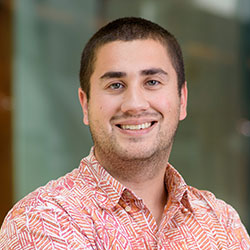Josiah Hester Receives CRII Grant
NSF awards Hester $175,000 to research next generation of energy-harvesting computers
Josiah Hester, assistant professor in the Department of Electrical and Computer Engineering and the Department of Computer Science, received a $175,000 Computer and Information Science and Engineering Research Initiation Initiative (CRII) two-year grant from the National Science Foundation (NSF).
 CAREER Awards are the foundation’s most prestigious honor for junior faculty members, and the NSF’s CRII program is referred to as the “Mini CAREER Award,” encouraging research independence early in a faculty member’s career.
CAREER Awards are the foundation’s most prestigious honor for junior faculty members, and the NSF’s CRII program is referred to as the “Mini CAREER Award,” encouraging research independence early in a faculty member’s career.
Hester received the award for his proposal titled "Systems and Tooling Enabling Adaptive Intermittent Computing.” The project seeks to develop the next generation of postage stamp sized—or smaller—energy-harvesting computers, which tap into the sun, radio waves, vibration, and other sources to power all of their sensing, inference, and communication tasks. By leaving batteries behind, these devices reduce cost and ecological waste, and function maintenance-free, potentially for decades, enabling numerous applications in the Internet of Things.
"For this grant, we will be exploring the use of these devices in critical applications in infrastructure monitoring and healthcare,” Hester said. “Think tiny computers buried in concrete to sense strain, or tiny battery-free computers sewn into clothes or worn as jewelry to monitor activity.”
The battery-free devices can lose power at any point because of fluctuations in energy availability, which makes programming, debugging, and deployment challenging. The goal of this project is to develop the foundational systems and tools that will make these devices resilient to power failures, dependable, easier to program, and able to function in unpredictable environmental and energy conditions.
The battery-free devices could allow wearables and sensor networks to be used where long-term, low-cost, invisible, massive scale sensing or computing are necessary, ranging from healthcare to wildlife tracking to space exploration.
“The tools and system we build out of this grant will all be open-source and open-hardware, freely available for anyone to use or adapt,” he said. “Hopefully this will democratize the development process, so any scientists, educators, or hobbyists will be able to build and deploy their own battery-free devices."
Hester directs Ka Moamoa, Northwestern University's mobile and ubiquitous computing lab. The name Ka Moamoa comes from the culture and traditions of Hester, a Native Hawaiian. The moamoa is a small notch on the extreme end of the traditional voyaging canoes of Hawai’i–significant in the Hawaiian tradition as the place where the guiding spirit, or akua, sits. Research at Ka Moamoa seeks to address global scale problems via novel and energy-efficient sustainable computing systems.
